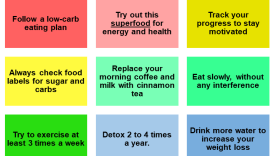The Ultimate Guide to Forming Healthy Lifestyle Habits

Understanding the Importance of Healthy Lifestyle Habits
Cultivating healthy lifestyle habits is essential for leading a fulfilling life. Many individuals overlook how daily choices can profoundly influence both physical and mental well-being. Whether it’s being mindful of nutrition, incorporating exercise, or prioritizing sleep, these habits form the foundation for a vibrant and energetic lifestyle.
- The Ultimate Guide to Forming Healthy Lifestyle Habits
- Understanding the Importance of Healthy Lifestyle Habits
- Benefits of Forming Healthy Habits
- Setting Goals for a Healthy Lifestyle
- SMART Goal-Setting for Long-Term Success
- Creating Action Plans for Achieving Goals
- Nutrition and Healthy Eating Habits
- Balanced Diet Essentials
- Meal Planning and Preparation Tips
- Incorporating Exercise into Your Routine
- Different Types of Physical Activities
- Creating a Sustainable Workout Schedule
- Prioritizing Mental Health and Well-Being
- Stress Management Techniques
- Importance of Self-Care Practices
- Building Healthy Sleep Habits
- Understanding the Importance of Sleep
- Tips for Improving Sleep Quality
- Hydration and Its Impact on Health
- Benefits of Staying Hydrated
- Ways to Ensure an Adequate Intake of Water
- Social Connections and Support Systems
- Importance of Building Healthy Relationships
- Strategies for Nurturing Social Connections
- Managing Time Effectively for a Healthy Lifestyle
- Prioritizing Tasks and Activities
- Creating a Balanced Daily Schedule
- Overcoming Challenges and Staying Motivated
- Common Obstacles to Forming Healthy Habits
- Strategies for Maintaining Motivation
- Tracking Progress and Making Adjustments
- Importance of Monitoring Your Habits
- How to Evaluate and Adjust Your Lifestyle Choices
Benefits of Forming Healthy Habits
The benefits of adopting healthy habits extend far beyond just physical appearance. For example, a friend of mine started running three times a week. Not only did he lose weight, but he also experienced increased energy and improved mood levels. Here are some key benefits:
- Enhanced Energy Levels: Regular physical activity boosts stamina.
- Improved Mood: Healthy habits contribute to better mental health.
- Stronger Immune System: Balanced nutrition helps fend off illnesses.
- Increased Longevity: Healthy choices can lead to a longer life.
By understanding and prioritizing these habits, individuals can create a positive ripple effect in their lives.
Setting Goals for a Healthy Lifestyle
SMART Goal-Setting for Long-Term Success
To truly transform your lifestyle, setting specific, measurable, achievable, relevant, and time-bound (SMART) goals is crucial. This method gives clarity and direction, making it easier to track progress and stay motivated. For instance, instead of saying, “I want to eat healthier,” a SMART goal would be, “I will eat at least three servings of vegetables each day for the next month.” Key components of SMART goals include:
- Specific: Define clear and precise objectives.
- Measurable: Ensure you can track your progress.
- Achievable: Set realistic goals considering your current lifestyle.
- Relevant: Align your goals with long-term aspirations.
- Time-bound: Set a deadline to create urgency.
Creating Action Plans for Achieving Goals
Once your goals are set, action plans help in translating them into tangible steps. Breaking down each goal into manageable tasks can turn aspirations into reality.
- Identify Resources: List tools, apps, or support groups you may need.
- Establish Routine: Dedicate specific times for activities like meal prep or workouts.
- Set Milestones: Celebrate small victories to maintain motivation, like completing a week of workouts or trying new healthy recipes.
By crafting clear action plans, the journey toward a healthier lifestyle becomes structured and attainable.
Nutrition and Healthy Eating Habits
Balanced Diet Essentials
Having established clear goals and action plans, focusing on nutrition is the next step. A balanced diet serves as the cornerstone of a healthy lifestyle. It ensures your body receives the necessary nutrients to function optimally. Key elements of a balanced diet include:
- Fruits and Vegetables: Aim for half your plate to be colorful veggies and fruits.
- Whole Grains: Choose whole grains over refined grains to increase fiber intake.
- Protein Sources: Incorporate lean proteins such as chicken, fish, beans, and nuts.
- Healthy Fats: Don’t shy away from healthy fats like olive oil and avocados.
Meal Planning and Preparation Tips
Meal planning is where the magic happens. It saves time, reduces stress, and helps you stick to your healthy eating habits. Consider these tips for effective meal prep:
- Set a Weekly Schedule: Dedicate one day to plan and prep meals for the week.
- Batch Cooking: Prepare large quantities of grains or proteins and store them in portioned containers.
- Experiment with Recipes: Try new dishes each week to keep meals exciting.
By incorporating these strategies, individuals can simplify the process of maintaining a nutritious diet while enjoying the journey of healthy eating.
Incorporating Exercise into Your Routine
Different Types of Physical Activities
With a foundation of healthy eating in place, it’s time to focus on incorporating exercise into your routine. Engaging in a variety of physical activities not only improves fitness but also keeps things interesting. Some popular types of exercise include:
- Aerobic Activities: Running, cycling, swimming, and dancing can boost cardiovascular health.
- Strength Training: Weight lifting or resistance bands help build muscle.
- Flexibility and Balance: Options like yoga and Pilates enhance flexibility and promote mental well-being.
- Recreational Sports: Join a local soccer or basketball league for social interaction and fun.
Creating a Sustainable Workout Schedule
To make exercising a habit, consistency is key. Crafting a sustainable workout schedule can ensure that physical activity becomes part of your daily life. Here are some tips for successful scheduling:
- Set Realistic Goals: Aim for at least 150 minutes of moderate aerobic activity each week.
- Mix It Up: Include a variety of workouts to prevent boredom.
- Choose Convenient Times: Identify when you’re most energetic, whether it’s mornings or evenings, and stick to that time.
By finding enjoyable activities and establishing a routine, individuals can easily make exercise a fulfilling part of their lives.
Prioritizing Mental Health and Well-Being
Stress Management Techniques
As individuals continue to integrate exercise and healthy eating into their lives, it’s equally important to prioritize mental health and well-being. Stress can be a significant barrier to achieving overall wellness. Thus, adopting effective stress management techniques is essential for maintaining balance and peace of mind. Consider the following strategies:
- Mindfulness Meditation: Taking just a few minutes to focus on your breath can reduce anxiety.
- Physical Activity: Exercise releases endorphins that can elevate your mood.
- Deep Breathing Exercises: A simple technique that can be done anywhere to calm your mind.
Importance of Self-Care Practices
In conjunction with managing stress, self-care practices play a vital role in nurturing mental health. Engaging in activities that promote relaxation and joy ensures emotional well-being. Examples of self-care include:
- Setting Boundaries: Allow yourself time to recharge by saying no to overcommitment.
- Pursuing Hobbies: Whether it’s painting, gardening, or reading, let creativity flourish.
- Quality Time: Spend time with loved ones to foster connections and boost your mood.
By wholeheartedly embracing these practices, individuals can enhance their overall well-being and create a more resilient mindset.
Building Healthy Sleep Habits
Understanding the Importance of Sleep
As individuals cultivate their physical health, mental well-being, and nutritional practices, it’s vital not to overlook the importance of sleep. Quality sleep is not merely a luxury; it is a foundational component of overall health. It plays a role in everything from cognitive function to mood regulation. For instance, when I make an effort to get at least seven hours of sleep, I notice that I’m more productive and emotionally balanced. Key benefits of good sleep include:
- Enhanced Memory: Sleep is crucial for consolidating memories and learning.
- Stronger Immunity: Adequate rest helps bolster the immune system against illness.
- Emotional Resilience: Quality sleep contributes to a more stable mood and better stress management.
Tips for Improving Sleep Quality
To optimize sleep quality, consider the following tips that can contribute significantly to restorative rest:
- Establish a Routine: Go to bed and wake up at the same time every day to regulate your body’s clock.
- Create a Relaxing Environment: Ensure your bedroom is dark, quiet, and cool for the best sleeping conditions.
- Limit Screen Time: Reduce exposure to screens at least an hour before bed, as blue light can interfere with melatonin production.
Embracing these healthy sleep habits can enhance overall wellness, making rest a priority in an individual’s journey toward a healthier lifestyle.
Hydration and Its Impact on Health
Benefits of Staying Hydrated
With sleep on the right track, it’s crucial to recognize the importance of hydration in maintaining overall health. Staying properly hydrated can dramatically influence various bodily functions and promote well-being. When I make it a point to drink enough water throughout the day, I often notice improvements in both my energy levels and concentration. Some key benefits of staying hydrated include:
- Enhanced Physical Performance: Proper hydration can reduce fatigue during exercise and improve endurance.
- Improved Digestion: Adequate water intake aids digestion and prevents constipation.
- Skin Health: Staying hydrated helps maintain skin elasticity and reduces dryness.
Ways to Ensure an Adequate Intake of Water
To make sure you’re drinking enough water, consider these simple strategies:
- Carry a Water Bottle: Keeping a reusable water bottle within reach serves as a reminder to hydrate.
- Set Reminders: Use your phone to set alerts throughout the day for regular water breaks.
- Flavor Your Water: If plain water isn’t appealing, add slices of fruit or herbs for a refreshing twist.
By incorporating these habits, individuals can easily achieve better hydration and experience all the benefits it brings to overall health.
Social Connections and Support Systems
Importance of Building Healthy Relationships
As individuals focus on hydration and physical well-being, it’s crucial to recognize the profound impact that social connections have on overall health. Healthy relationships can greatly enhance emotional resilience, reduce stress, and even improve physical health outcomes. Personally, I’ve noticed that spending quality time with friends or family helps lift my spirits and provides a sense of belonging that is incredibly fulfilling. Key reasons to prioritize building healthy relationships include:
- Emotional Support: Friends and family can provide comfort during challenging times.
- Accountability: Having supportive people encourages adherence to healthy lifestyle choices.
- Increased Happiness: Positive relationships contribute to lower levels of anxiety and depression.
Strategies for Nurturing Social Connections
To cultivate and maintain these valuable connections, try implementing these friendly strategies:
- Schedule Regular Meetups: Plan weekly coffee dates or monthly dinners to catch up with loved ones.
- Engage in Group Activities: Join clubs or classes that involve shared interests to meet new people.
- Use Technology Wisely: Don’t hesitate to send a quick text or make a video call to maintain connections, regardless of distance.
By investing time and effort into nurturing social ties, individuals can significantly boost their emotional well-being and enrich their lives.
Managing Time Effectively for a Healthy Lifestyle
Prioritizing Tasks and Activities
With strong social connections in place, managing time effectively becomes essential for maintaining a healthy lifestyle. When life gets hectic, it’s easy to let wellness activities fall by the wayside. Prioritizing tasks helps ensure that essential health practices aren’t overlooked. I’ve found that creating a hierarchy for daily tasks not only reduces stress but also keeps my focus on what truly matters. Consider these steps to prioritize your daily activities:
- Identify Key Tasks: Make a list of daily tasks and highlight those that directly contribute to your health, like exercise and meal prep.
- Implement the Eisenhower Matrix: Categorize tasks into urgent and important to help focus on your priorities.
- Set Realistic Goals: Break larger tasks into manageable steps, making them less overwhelming.
Creating a Balanced Daily Schedule
Once tasks are prioritized, crafting a balanced daily schedule becomes vital. A well-structured routine not only increases productivity but also ensures adequate time for self-care and relaxation. Here are some tips for crafting your schedule:
- Allocate Dedicated Time: Block out specific times for workouts, meal preparation, and relaxation.
- Include Breaks: Schedule short breaks throughout your day to prevent burnout and allow for mental clarity.
- Stay Flexible: Life is unpredictable, so be ready to adjust your plans as needed without guilt.
By mastering time management, individuals can more easily maintain a healthy lifestyle while achieving their personal and professional goals.
Overcoming Challenges and Staying Motivated
Common Obstacles to Forming Healthy Habits
Even with a solid daily schedule in place, it’s essential to acknowledge that challenges may arise when forming new healthy habits. Life can present various obstacles that threaten to derail progress. Personally, I’ve faced moments when stress or a lack of time made it difficult to stick to my routines. Common obstacles include:
- Time Constraints: Busy schedules often lead to skipped workouts or unhealthy meals.
- Lack of Motivation: Initial enthusiasm can fade, making it hard to stay committed.
- External Influences: Social gatherings or peer pressure may tempt individuals to stray from their healthy choices.
Strategies for Maintaining Motivation
To successfully navigate these challenges, it’s crucial to implement strategies that help maintain motivation:
- Set Small, Achievable Goals: Break larger goals into smaller, actionable steps for a sense of accomplishment.
- Track Progress: Keep a journal or use apps to monitor your journey and celebrate milestones.
- Surround Yourself with Support: Engage with friends or join a community focused on health and wellness.
By recognizing challenges and employing these motivational strategies, individuals can successfully overcome hurdles and remain on their path to better health.
Tracking Progress and Making Adjustments
Importance of Monitoring Your Habits
After fostering motivation and overcoming challenges, the next crucial step is tracking progress and making adjustments. Monitoring habits provides invaluable insight into what works and what doesn’t. Personally, I’ve found that keeping track of my daily activities not only helps me stay accountable but also reveals patterns that I might otherwise overlook. Key reasons to monitor your habits include:
- Accountability: Regularly reviewing your progress keeps you committed to your goals.
- Celebrating Success: Recognizing improvements reinforces positive behavior and motivates further efforts.
- Identifying Obstacles: Tracking helps pinpoint areas where adjustments are necessary, preventing stagnation.
How to Evaluate and Adjust Your Lifestyle Choices
To effectively evaluate and adjust your lifestyle, consider these practical steps:
- Set a Regular Review Schedule: Dedicate time weekly or monthly to assess your progress and reflect on any changes needed.
- Be Honest with Yourself: Evaluate both successes and setbacks candidly to understand your journey fully.
- Make Flexible Plans: Adjust your goals and strategies as needed, based on what you’ve learned about your habits.
By implementing these practices, individuals can ensure continuous growth and move closer to achieving their health aspirations.





